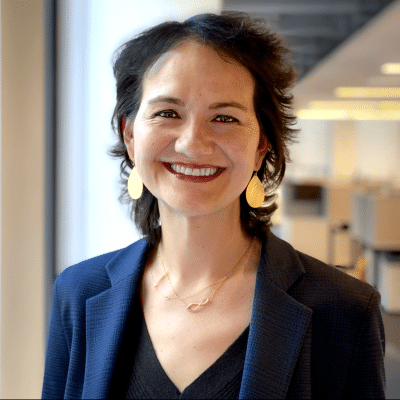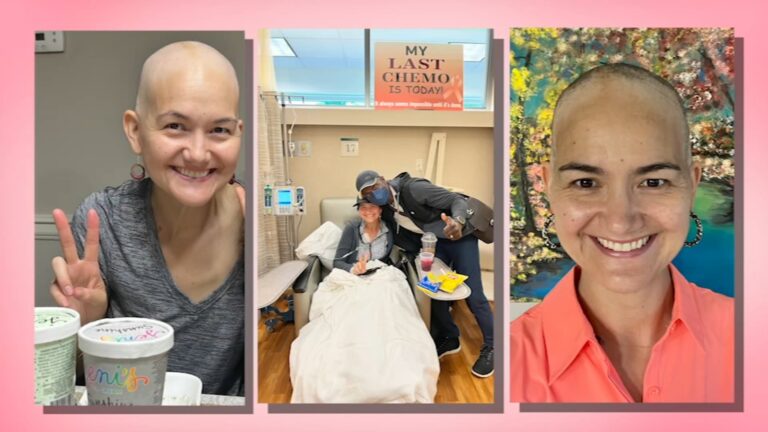It all started in March 2022. Annie Miyazaki-Grant’s sister Marissa accidentally found a lump in her breast. Inspired by her sister’s discovery, Annie decided to perform a self-exam that same evening. To her shock, she too found a lump.
From there, their lives changed dramatically as both sisters went through mammograms, biopsies, and countless doctor’s appointments. Within a week, both were diagnosed with breast cancer. For Annie, it was an aggressive, triple-positive cancer in both breasts. It was surreal, like something out of a bad dream.
Choosing the Right Care Center
Living in New York City, Annie initially considered local treatment options. However, the chaotic environment crowded clinics, loud streets, and the need to walk blocks for different tests felt overwhelming.
Annie and her family had previously spent time in East Falls, Pennsylvania, and participated in Fox Chase Cancer Center’s Paws for the Cause event. The peaceful campus and the compassionate people left an impression. She thought, “This is where I need to be.”
At Fox Chase Cancer Center, Annie felt at home. The team’s focus on cancer care and the serene, green environment were exactly what she needed for her treatment journey.
Empathy from the Very First Day

At Fox Chase, Annie’s first meeting with her medical oncologist and nurse, Monica Faherty-Maletz, was a game-changer. They spent over three hours discussing every aspect of her diagnosis, from her treatment options to her long-term quality of life.
“They didn’t push me into any decisions,” Annie recalls. “They listened and genuinely wanted to understand what mattered most to me.”
Her treatment began with neoadjuvant chemotherapy and targeted HER2 biologic therapies. These therapies aimed to shrink the tumors before surgery.
The Care Team That Made a Difference
Annie’s chemo nurse, John, provided incredible support during her infusions. “He explained everything—what I might feel, what to expect, and even how to prepare for the next session,” Annie says. His empathy extended to her mother, who accompanied her to treatments.
“John would tell my mom, ‘You better write this stuff down,’” Annie laughs. It was these small acts of kindness and understanding that made a huge difference.
Her care team included many incredible nurses Kelly, Nancy, Dana, and Deborah each of whom showed patience and compassion during her weekly infusions.
Surgery and Recovery
In October 2022, Annie underwent a double mastectomy, performed by Dr. Andrea Porpiglia. Thankfully, her lymph nodes were clear of cancer, so she didn’t require radiation.
Dr. Adam Walchak, a skilled plastic and reconstructive surgeon, performed her reconstructive surgeries. Annie describes his team as “fantastic” and felt cared for at every step of the process.
She also leaned on Dr. Emmie Chen, a psychiatrist specializing in cancer care. Dr. Chen helped Annie manage the stress and anxiety that came with her diagnosis and treatment.
A Patient-Centered Approach
Annie found her new medical oncologist, Dr. Jennifer Winn, to be equally compassionate and reassuring. She describes Fox Chase’s approach as truly patient-centered:
“You never feel like a burden or like you’re asking for too much. Everyone, from the clinical teams to the volunteers and even the security guards, goes out of their way to make you feel comfortable.”
Breast Cancer Awareness and Early Detection
Why Early Detection Matters
Annie emphasizes the importance of regular self-exams and early screening. Her journey began with a simple self-check, proving that awareness can be lifesaving.
Dr. Porpiglia, Annie’s surgeon, agrees. “Self-exams are an easy and effective tool,” she says. “Many of my patients first discovered their cancer through self-checks.”
Mammograms are another vital tool, especially 3D mammograms, which provide detailed images of breast tissue. For younger women, who may not yet be eligible for regular mammograms, knowing their family history and risk factors is crucial.
Are You at High Risk?
Certain factors can increase the risk of breast cancer. Dr. Porpiglia encourages younger women to be aware of the following:
- Personal or family history: Breast or ovarian cancer under age 40, or colon/pancreatic cancer under age 50.
- Genetic mutations: BRCA1, BRCA2, and other mutations significantly raise the risk.
- Previous chest radiation: Especially if done in childhood or early adulthood.
If you meet these criteria, talk to your doctor about earlier or more frequent screenings.
Tips for Early Detection
- Perform regular self-exams.
- Schedule yearly mammograms starting at age 40, or earlier if you’re at high risk.
- Consider 3D mammograms for more detailed imaging.
Life After Treatment
Finding Strength and Giving Back
Annie didn’t let cancer define her. Just six weeks after her double mastectomy, she completed a half-marathon. “It was my way of moving forward,” she says.
Today, Annie is giving back as a patient advisor at Fox Chase. She also serves as the 2024 Paws for the Cause patient ambassador, raising awareness and funds to support cancer patients.
FAQs
1. What is triple-positive breast cancer?
Triple-positive breast cancer tests positive for estrogen, progesterone, and HER2 receptors. This means treatments can target these receptors to slow or stop the cancer.
2. What is neoadjuvant chemotherapy?
It’s chemotherapy given before surgery to shrink tumors, making them easier to remove and reducing the chance of cancer spreading.
3. What are 3D mammograms?
3D mammograms provide detailed, layered images of breast tissue, improving accuracy in detecting abnormalities.
4. How can I support someone with breast cancer?
Be present, listen, and offer practical help, like cooking meals or attending appointments. Small acts of kindness can make a big difference.
5. Is it safe to exercise during cancer treatment?
Always consult your doctor, but light exercise like walking or yoga can help with recovery and improve mental health.
A Message of Hope
Annie’s journey is a testament to resilience, the power of compassion, and the importance of early detection. Whether you’re navigating your own diagnosis or supporting a loved one, remember that you’re not alone.
As Annie puts it, “You don’t have anything without your health. Take care of yourself, prioritize screenings, and lean on the people around you.”
References
- Fox Chase Cancer Center: Patient-Centered Care
- Dr. Andrea Porpiglia: Importance of Early Detection
- Breast Cancer Awareness: American Cancer Society


